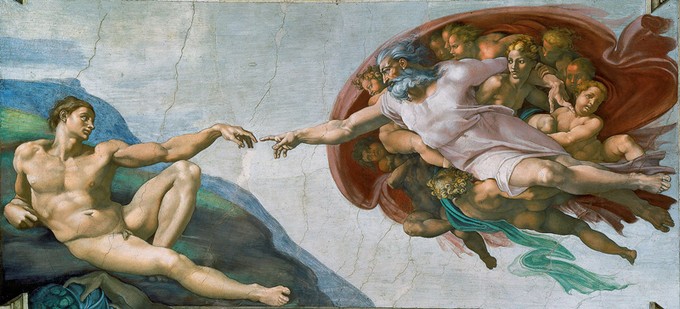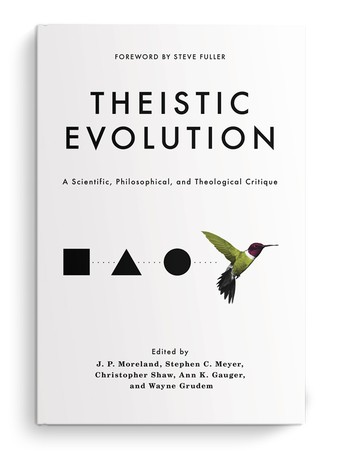
Did God use evolution to create humanity and all other life from a common ancestor? A growing number of prominent Christian theologians, pastors and scientists have begun answering “yes” in recent years, making the case that theistic evolution offers the best explanation of scientific evidence.
In response, a team of scholars — including influential Biola philosophy professor J.P. Moreland — have teamed up to produce a massive new book, Theistic Evolution: A Scientific, Philosophical, and Theological Critique (Crossway, November 2017). Over the course of 31 chapters and 1,000 pages, the volume seeks to make a comprehensive case against theistic evolution, articulating why it’s problematic, both scientifically and biblically, to accept the view that God used undetectable evolutionary mechanisms to produce all life. Biola Magazine recently spoke with Moreland, one of the project’s five lead editors, about the ongoing debate. Below is an edited transcript.
J.P., “theistic evolution” is a term that can mean different things to different people. How would you define the view that you’re critiquing in this book?
Let’s begin with evolution. There are three definitions: The first is change within limits. That’s called microevolution and everybody accepts that. The second is called the thesis of common descent, which is that all living things can trace their ancestral history back to an original organism or a small cluster of original organisms. And the third definition is the “blind watchmaker” thesis, which is that all living things and their parts are the result of purely unguided forces that amount to a combination of natural law, pure random-chance mutations and the struggle for reproductive advantage. Our primary focus is on critiquing the third definition, the blind watchmaker thesis, though we do have a critique of the thesis of common descent, especially with four chapters on the origins of Adam and Eve.
Theistic evolution affirms that the general theory of common descent and the blind watchmaker is true, but God in some way or another guided the processes — as long as there is no way to detect that he did it. If you are able to detect God’s activity scientifically, that would be the intelligent design [ID] view. The theistic evolutionist wants to make sure no theology or religion or any idea of God or any of that enters into the methods of science.

If somebody is wrestling with how to reconcile science and Scripture, and finds theistic evolution compelling, which arguments would you encourage them to investigate further?
First, the origin of life is an insurmountable difficulty for the theistic evolutionist. Second, the origin of biological information. Information is a third kind of thing that is basic in the universe and it can’t emerge from random processes and natural law. Third, the Cambrian Explosion. In the Cambrian strata of rock you have all the major phyla of organisms appearing abruptly, and in the fossil record earlier than that you find nothing that’s leading up to it. It’s called the Big Bang of biology. It’s as though God said, “Let there be,” and then all of these life forms just suddenly appear. Fourth, the origin of consciousness is a problem. And then irreducible complexity, where living things have parts that don’t work unless all the other parts are in place; you can’t evolve a structure like that just a little bit at a time.
The main thing that’s sustained both theistic and naturalistic evolution is actually not the scientific evidence — even in Darwin's day. What’s sustained it is methodological naturalism. It’s the idea that while you’re doing science you can only appeal to natural causes and natural explanations for data. You can’t appeal to a divine or a personal action of any kind of being. So science has got to make a purely natural story of cause and effect work, because if they didn’t they would be abandoning science itself. Our book has a huge critique of the concept of methodological naturalism. We show that there are places all over science, in forensic science and in archeology and in other places, where scientists explain data by appealing not to a natural law or a natural cause but the intentional actions of an agent or a person. There’s no reason why this can’t be done in biology if the evidence justifies it.
You authored a chapter with a particularly provocative title: “How Theistic Evolution Kicks Christianity out of the Plausibility Structure and Robs Christians of Confidence that the Bible is a Source of Knowledge.” What’s your main argument in that chapter?
Christians don’t want to look at Scripture or the fundamental tenets of their religion as things that you have to choose to believe. They’ve never been taken as faith objects. Rather they’ve been taken by the church to be things that you can actually know to be true, and people give greater authority to what we think we know than what we merely have to believe. If the Christian religion becomes just a belief system, it will be marginalized from culture and Christians themselves won’t have the courage to share their faith because they’re not at all confident that what they believe is true in the first place.
Theistic evolution communicates that scientists are a far, far more secure source of knowledge of reality than biblical or theological preaching and philosophy. And this is not true. But if we are constantly seeing science force us to revise the Bible so it will be consistent with science, at some point you start saying to yourself, “Well, shoot, in 50 years what else is going to be revised?” By appealing to theistic evolution, we are actually undermining people’s confidence in the Bible rather than giving them a way to integrate science and Scripture. It is the cure that killed the patient, because that way of integrating always means that science gets to tell us what’s real, and it’s the theologian who has to scramble and dive for foxholes and wave the white flag of surrender and ask the scientists what he can say Genesis teaches.
Many proponents of theistic evolution would describe themselves as having a high view of Scripture. For them, the debate isn’t about Scripture’s authority or accuracy; it’s about understanding what Scripture intends to teach. In your view, how is evolution incompatible with what Scripture intends to teach?
Well first of all, the Scriptures say that the universe and the heavens declare the glory of God. Paul says it speaks clearly of his existence. If we can explain everything about the beginnings of life and everything else without needing God as an explanatory tool — in other words, if it can be completely explained naturalistically — it’s very hard to see how it gives evidence of the glory of God and his existence. Secondly, I do think there’s a legitimate difference in the text about the days, how old the universe is and how old the earth is. I’m an old-earth creationist, a progressive creationist, not a young-earth one, and there are solid Old Testament scholars who say there is plenty of room for differences on that issue. But it seems clear that when you read the Scriptures, God actually did some things and put his stamp of brilliance on living things that he made. And if that’s true, then the blind watchmaker thesis — that all of this could happen naturally and God can guide as long as there’s no evidence of it — seems to me to be to flying in the face of a fairly standard read of the activity of God in Genesis in bringing into being the various kinds of living things.
Some people might say, “Well, I can’t know how God created, just that he did it.” Why is this an important issue for Christians to wrestle with? What’s at stake here?
First is the historical credibility of the early chapters of Genesis. They provide the theological foundation for Christ’s coming. Jesus himself acted as though Adam and Eve were real. If we think the early chapters of Genesis were some mythological narrative just to teach some sort of ethical or theological truth, but it wasn’t rooted in history, then that calls into question the very foundation of the rest of the Scriptures, because many of them are addressing what happened in those early chapters of Genesis.
In addition to that, if you’re going to say this is the way God chose to create, then you’re going to say that God chose to use evil as his primary means of creating. In other words, God had a lot of different ways he could have brought things into being and his option of choice was to use the torture and pain of animals. Now that doesn’t sound to me like a very good God. My hope would be that the jungles being red in tooth and claw is a result of something going wrong with the universe rather than it being God’s first choice as to how he wanted to create. This calls into significant question God’s character.
Studies have shown that this supposed conflict between science and Scripture is one of the primary causes cited for young people walking away from the faith.
Barna did a study that identified six reasons why people are leaving the faith and the church. One of the six was the church is not helping people understand how to relate to contemporary science. What we’re trying to say is that the constant revisionist approach is going to yield peace, but it’s like pacifism in warfare. It’s like you keep paying a country not to bomb you. Eventually you are going to run out of money, if you know what I mean. And it’s not needed! We believe that we have been able to make a case that will show anybody who’s willing to read this book that extremely smart, knowledgeable, well-educated people have presented arguments that have not been answered yet by the other side. And theistic evolution and naturalistic evolution are being propped up by social pressure, not by the actual strength of the arguments.
ABOUT THE EXPERT
J.P. Moreland is a distinguished professor of philosophy at Biola’s Talbot School of Theology. He is an author of, contributor to or editor of over 90 books, including Theistic Evolution: A Scientific, Philosophical, and Theological Critique, and was recently named one of the 50 most influential living philosophers by thebestschools.org.
 Biola University
Biola University.jpg)

